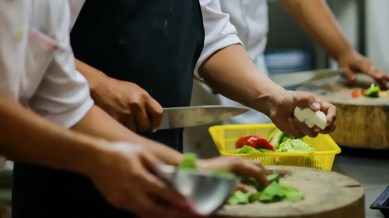Stay updated with the latest - Click here to follow us on Instagram
Amid ‘spitting in food’ row, Uttarakhand frames guidelines for eateries — cameras in kitchens, IDs for staff
The guidelines, which come amid festival season and at a time when reports of food tampering and adulteration have caused health concerns, provides for checks and inspection and requires commercial food establishments to display their licences prominently.

Compulsory photo IDs and protective gear for food handlers, cameras in commercial kitchens, and boards clearly displaying whether the meat sold is ‘halal’ or ‘jhatka’ and hefty fines of up to Rs 1 lakh for transgressions – these are among the Uttarakhand government’s new food safety guidelines issued to the hospitality and food industry.
Significantly, the Dehradun Police arrested two people last week for spitting in a teapot in Mussoorie. It also comes weeks after the government of neighbouring Uttar Pradesh made it mandatory for food establishments to “prominently” display to customers the names of “the operator, proprietor, manager, and other relevant personnel”.
According to the SOP, masks, gloves and headgears to ensure hygiene standards. CCTV cameras are mandatory in kitchen areas to ensure continuous monitoring.
Fines for offenders will range from Rs 25,000 to Rs 1 lakh for offenders. Regular raids and sampling are being conducted across the state to help keep food safety standards, it says.
“Recent incidents of adulteration involving human waste and other contaminants in food and drinks have surfaced in different parts of the state. Such practices are in blatant violation of the Food Safety and Standards Act, 2006,” the guidelines, signed by Uttarakhand’s Health Secretary and FDA Commissioner R Rajesh Kumar, said, stressing the importance of controlling unhygienic habits such as smoking, spitting, or scratching body parts while handling food.
The SOP includes several key measures to ensure better hygiene in food establishments across Uttarakhand. A critical requirement is that food establishments must not employ individuals suffering from infectious diseases in food-related activities.
According to the Food Safety and Standards (Licensing and Registration of Food Business Operators) Regulations, 2011, operators are mandated to always maintain a list of employees along with their medical certificates.
The SOP also requires food businesses to display their licences at prominent locations, ensure accurate daily records of production, raw material usage, and sales, and prohibit the contamination of food products with harmful substances. Additionally, food businesses operating without proper licences must immediately comply with licencing regulations, with punitive action provided against those found in violation.